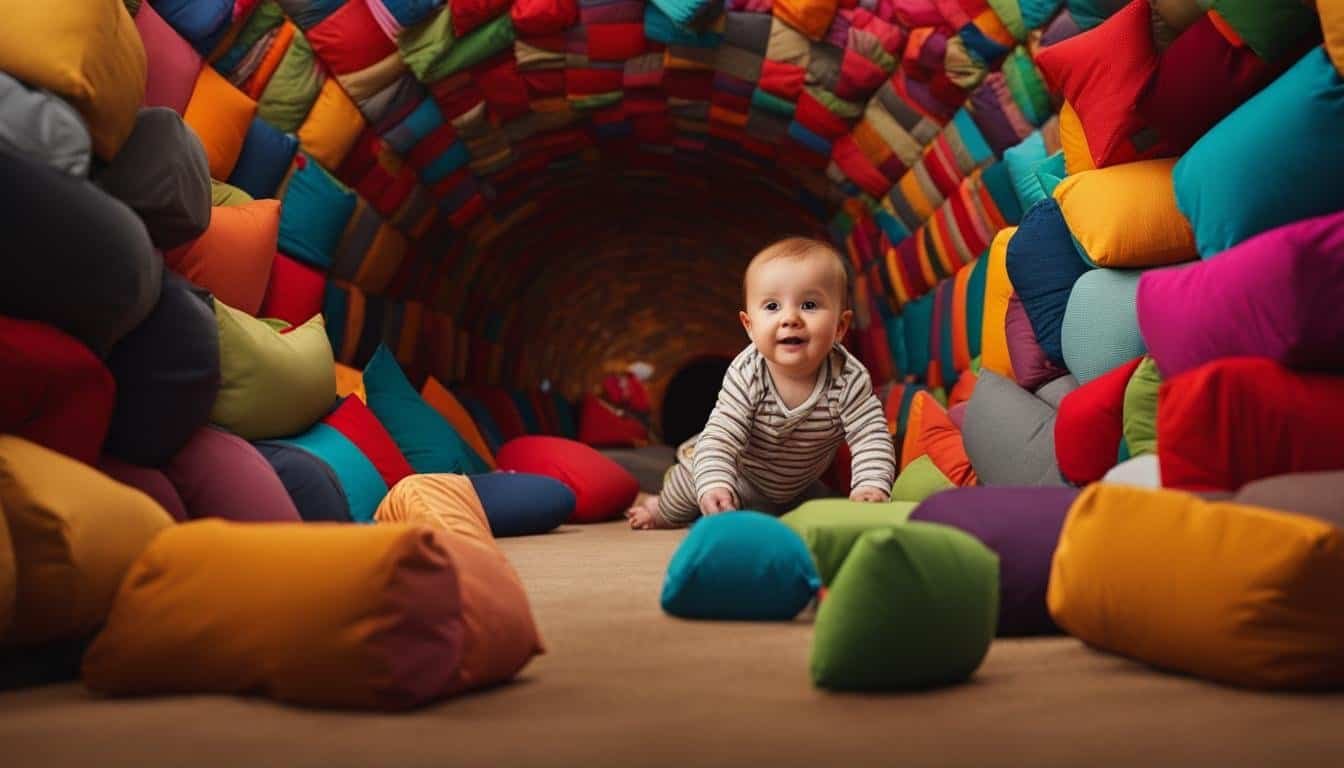Gross Motor Skills Activities for Infants: Promoting Physical Development
Gross motor skills are crucial for infants’ physical development. These skills involve large movements such as rolling over, sitting up, and walking. It is important to engage infants in activities that promote the development of these skills.
Key Takeaways:
- Infants’ gross motor skills involve larger movements like rolling over, sitting up, and walking.
- Engaging infants in activities that promote gross motor skills development is crucial for their physical growth.
- Some recommended activities include tummy time, sitting support, crawling games, and creating an obstacle course.
- Monitoring your child’s gross motor skills development is important to identify any potential delays or issues.
- Consult with a healthcare provider if you have concerns about your child’s gross motor skills development.
What are Gross Motor Skills in Infants?
Gross motor skills refer to the large physical movements that infants gradually develop as they grow. These skills involve using the larger muscles of the body and are essential for overall physical development. Infants start developing gross motor skills from the early stages of life, and they continue to refine these skills as they progress through different milestones.
Some examples of gross motor skills in infants include:
- Lifting and moving their legs
- Rolling over from their back to their tummy and vice versa
- Sitting up without support
- Crawling on their hands and knees
- Taking their first steps and eventually walking independently
Gross motor skills are different from fine motor skills, which involve smaller, precise movements using smaller body parts like hands and fingers. While fine motor skills develop later, gross motor skills are the foundation on which infants build their physical abilities.
During the early stages, infants gradually gain control over their bodies and learn to coordinate their movements. They start by developing head control, then progress to being able to lift their head and chest while lying on their tummy. As they grow and develop, they become capable of sitting up without support, crawling, and eventually taking their first steps.
Gross motor skills are an important aspect of infant development milestones. They contribute to the overall physical growth, strength, and coordination of infants, setting a foundation for future movements and activities.
Gross Motor Skills Examples for Infants and Older Babies
Gross motor skills play a vital role in infants’ physical development. As they grow and explore their environment, they gradually acquire and refine these skills. It’s important to understand the milestones associated with gross motor skills and provide opportunities for infants to practice and develop them.
Infant Development Milestones
Here are some essential gross motor skills examples and milestones you can look out for as your baby grows:
- Improved Head Control: Around 3 to 4 months of age, babies start achieving better control over their head movements. They can hold their head up when lying on their tummy and turn it from side to side.
- Sitting Upright: Between 6 to 8 months, most infants can sit without support. Initially, they may need some assistance or use their hands for balance, but they gradually become more stable in this position.
- Crawling: Crawling is an important milestone that typically occurs between 7 to 10 months. Babies develop the coordination and strength to move around on their hands and knees, exploring their surroundings with newfound independence.
- Standing and Walking: By around 9 to 12 months, many babies start pulling themselves up to stand using furniture or other support. Soon after, they take their first wobbly steps, gradually gaining confidence and balance.
It’s important to note that these milestones can vary for each baby. Some infants may achieve them earlier, while others may take more time. The key is to provide a safe and nurturing environment that encourages their exploration and practice of these gross motor skills.
Encouraging Gross Motor Skills Development
There are various activities you can engage in to support your baby’s gross motor skills development:
- Provide supervised tummy time where your baby can strengthen their neck and shoulder muscles.
- Use pillows or cushions to support your baby as they practice sitting upright.
- Encourage crawling by creating fun games or setting up safe obstacles for them to navigate.
- Assist your baby in standing and walking by offering stable support and holding their hands.
Remember, every baby develops at their own pace, so avoid comparing your child’s progress to others. Providing a stimulating environment and offering plenty of opportunities for movement and exploration will help them reach their milestones.
Activities to Encourage Gross Motor Skills Development
There are several activities that can help support the development of gross motor skills in infants. These activities not only aid in their physical development but also provide an opportunity for exploration and learning. Here are some engaging and beneficial activities:
Tummy Time
Encourage your baby to spend time on their tummy, as it helps strengthen their neck, back, and shoulder muscles. Place colorful toys or mirrors in front of them to grab their attention and motivate them to lift their head and reach for the objects around them.
Sitting Support
As your baby starts to sit up independently, provide support with a soft pillow or cushion to prevent falls and build core strength. Allow them to reach for toys and objects placed just out of their grasp, encouraging them to lean and balance while sitting.
Crawling Games
Set up a safe and spacious area where your baby can explore and crawl freely. Place enticing toys or objects at different distances to motivate them to move. Crawling helps strengthen their arms, shoulders, and leg muscles, promoting overall gross motor skills development.
“Crawling is not only important for physical development but also plays a crucial role in intellectual, social, and emotional growth.”
Creating an Obstacle Course
Design a simple obstacle course using soft pillows, cushions, tunnels, or low furniture. This encourages your baby to crawl, climb, and navigate through different obstacles, improving their balance, coordination, and overall gross motor skills.
Remember, safety is paramount during these activities. Always supervise your baby and ensure the environment is free from hazards. Gradually increase the complexity of the activities as your baby grows and develops their gross motor skills.
Engaging in these activities provides a stimulating environment for your baby to explore and develop their gross motor skills, making them wonderful gifts under $150 for supporting early growth. Not only will they thrive physically, but they will also gain confidence in their abilities and enhance their overall development.
Gross Motor Skills Delay
While most infants develop gross motor skills within a typical timeframe, it is important to be aware that some may experience delays in their development. Monitoring your child’s milestones is essential in identifying any concerns and seeking appropriate guidance. If you notice any delays or differences in your child’s gross motor skills, it is recommended to consult with a healthcare provider for further evaluation.
Gross motor skills delay refers to the slowed or atypical progression in achieving age-appropriate physical developmental milestones. These milestones include actions such as rolling over, sitting up, crawling, and eventually walking. Every child develops at their own pace, but delays in gross motor skills might indicate underlying developmental issues that require attention and intervention.
Early identification of gross motor skills delays can lead to timely interventions, ensuring that infants receive the support they need to catch up and reach their developmental milestones. This may involve early intervention services, physical therapy, or other targeted interventions based on the specific needs of the child.
“It’s important to remember that each child is unique, and developmental delays should not be cause for undue alarm. However, it is crucial to address any concerns promptly to ensure the best outcomes for your child’s overall development.”
Parents and caregivers play a vital role in supporting infants with gross motor skills delays. Engaging in activities that encourage movement, providing a safe environment for exploration, and offering ample opportunities for practice are essential. Consistency and patience are key as infants progress at their own pace, gradually gaining confidence in their physical abilities.
As with any aspect of infant development, it is advisable to consult with healthcare professionals for personalized advice and guidance. They can assess your child’s specific needs, provide appropriate recommendations, and guide you through the journey of supporting your child’s gross motor skills development.
Remember, while gross motor skills delays may present challenges, they can be overcome with early detection, intervention, and the love and support of dedicated caregivers.
Conclusion
Gross motor skills play a vital role in an infant’s physical development. By engaging infants in activities that promote the development of these skills, caregivers can help them reach important motor skill milestones. Through consistent practice and a supportive environment, infants can develop their gross motor skills and set the stage for future physical growth.
Providing sensory play for infants is essential in supporting their physical development. Sensory play activities, such as playing with textured toys or exploring different materials, can help infants develop their motor skills while stimulating their senses. This type of play allows infants to explore their world and further enhance their gross motor skills through hands-on experiences.
It is important to remember that every infant develops at their own pace. While some may reach motor skill milestones earlier, others may take longer. As caregivers, it is crucial to create a safe and stimulating environment that encourages infants to explore and practice their motor skills. By offering a variety of age-appropriate activities and toys, caregivers can support infants in their physical development journey.
In conclusion, providing opportunities for infants to engage in activities that promote gross motor skill development, such as sensory play, is vital for their overall physical growth. By fostering a nurturing environment and offering age-appropriate activities, caregivers can help infants reach important motor skill milestones and lay a strong foundation for their future physical abilities.







